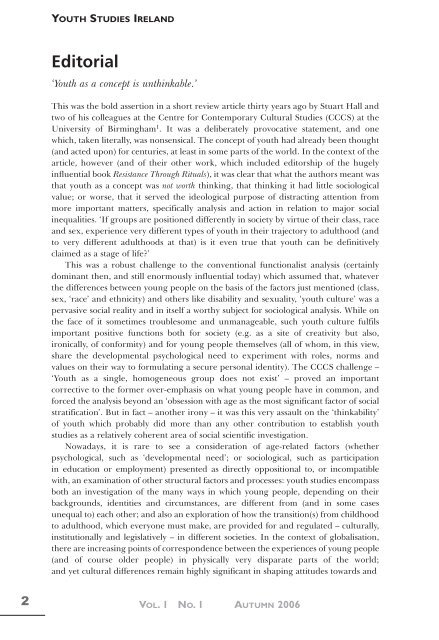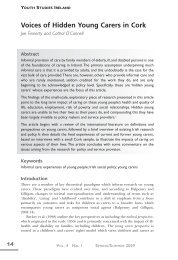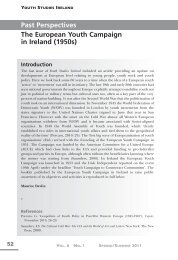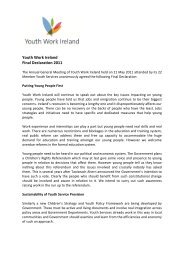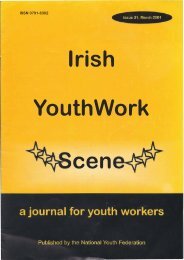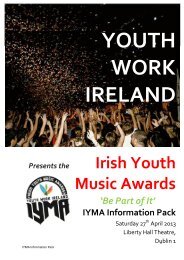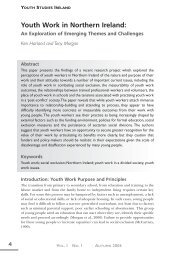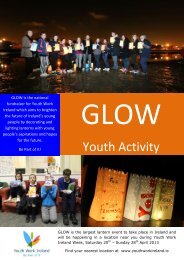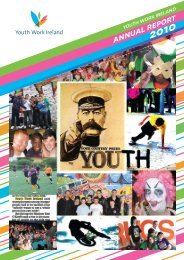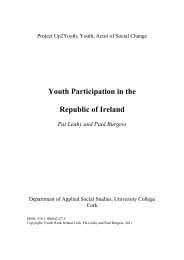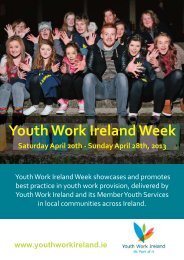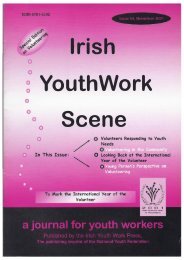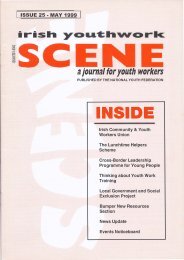Download full edition - Youth Work Ireland
Download full edition - Youth Work Ireland
Download full edition - Youth Work Ireland
You also want an ePaper? Increase the reach of your titles
YUMPU automatically turns print PDFs into web optimized ePapers that Google loves.
YOUTH STUDIES IRELANDEditorial‘<strong>Youth</strong> as a concept is unthinkable.’This was the bold assertion in a short review article thirty years ago by Stuart Hall andtwo of his colleagues at the Centre for Contemporary Cultural Studies (CCCS) at theUniversity of Birmingham 1 . It was a deliberately provocative statement, and onewhich, taken literally, was nonsensical. The concept of youth had already been thought(and acted upon) for centuries, at least in some parts of the world. In the context of thearticle, however (and of their other work, which included editorship of the hugelyinfluential book Resistance Through Rituals), it was clear that what the authors meant wasthat youth as a concept was not worth thinking, that thinking it had little sociologicalvalue; or worse, that it served the ideological purpose of distracting attention frommore important matters, specifically analysis and action in relation to major socialinequalities. ‘If groups are positioned differently in society by virtue of their class, raceand sex, experience very different types of youth in their trajectory to adulthood (andto very different adulthoods at that) is it even true that youth can be definitivelyclaimed as a stage of life?’This was a robust challenge to the conventional functionalist analysis (certainlydominant then, and still enormously influential today) which assumed that, whateverthe differences between young people on the basis of the factors just mentioned (class,sex, ‘race’ and ethnicity) and others like disability and sexuality, ‘youth culture’ was apervasive social reality and in itself a worthy subject for sociological analysis. While onthe face of it sometimes troublesome and unmanageable, such youth culture fulfilsimportant positive functions both for society (e.g. as a site of creativity but also,ironically, of conformity) and for young people themselves (all of whom, in this view,share the developmental psychological need to experiment with roles, norms andvalues on their way to formulating a secure personal identity). The CCCS challenge –‘<strong>Youth</strong> as a single, homogeneous group does not exist’ – proved an importantcorrective to the former over-emphasis on what young people have in common, andforced the analysis beyond an ‘obsession with age as the most significant factor of socialstratification’. But in fact – another irony – it was this very assault on the ‘thinkability’of youth which probably did more than any other contribution to establish youthstudies as a relatively coherent area of social scientific investigation.Nowadays, it is rare to see a consideration of age-related factors (whetherpsychological, such as ‘developmental need’; or sociological, such as participationin education or employment) presented as directly oppositional to, or incompatiblewith, an examination of other structural factors and processes: youth studies encompassboth an investigation of the many ways in which young people, depending on theirbackgrounds, identities and circumstances, are different from (and in some casesunequal to) each other; and also an exploration of how the transition(s) from childhoodto adulthood, which everyone must make, are provided for and regulated – culturally,institutionally and legislatively – in different societies. In the context of globalisation,there are increasing points of correspondence between the experiences of young people(and of course older people) in physically very disparate parts of the world;and yet cultural differences remain highly significant in shaping attitudes towards and2 VOL. 1 NO. 1 AUTUMN 2006


